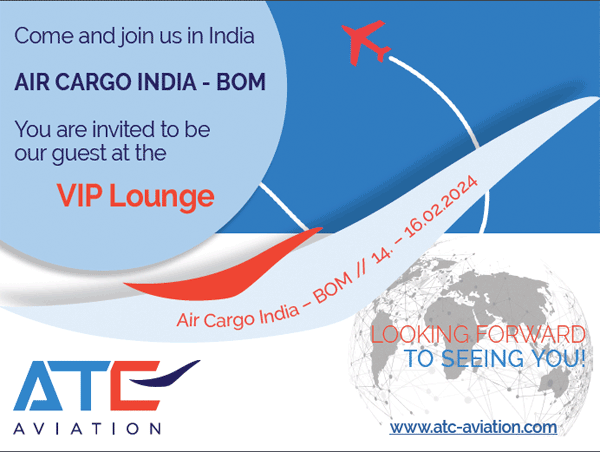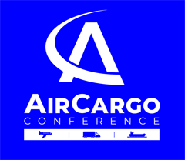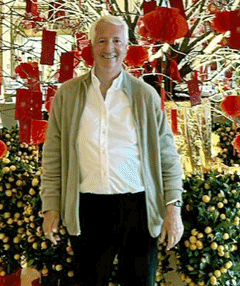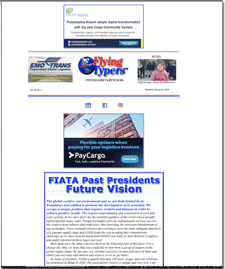
 |
 |
 #INTHEAIREVERYWHERE |
| Vol. 23 No. 7 | Tuesday February 13, 2024 |
| |
 |
 Big
organizational news out of AirCargo 2024 the kickoff event yesterday which
partners the The Airforwarders Association, the AEMCA (Air and Expedited
Motor Carriers Association) and Airports Council International - North America
in Louisville, Kentucky is that Jim Luciani (left) was named Executive
Director of AEMCA. Big
organizational news out of AirCargo 2024 the kickoff event yesterday which
partners the The Airforwarders Association, the AEMCA (Air and Expedited
Motor Carriers Association) and Airports Council International - North America
in Louisville, Kentucky is that Jim Luciani (left) was named Executive
Director of AEMCA.AEMCA is an independent association whose core values created in 1988 are to offer members the opportunity to educate, advocate and promote business development through networking with members and industry groups. Over the years, the AEMCA has represented the air freight trucking industry on many legislative and security issues, as well as keeping up with the ever-changing demands of this industry.  Also announced opening day in Louisville the
date and location for the 2025 AirCargo event: March 2, 2025 in Arlington,
Texas.
Also announced opening day in Louisville the
date and location for the 2025 AirCargo event: March 2, 2025 in Arlington,
Texas.Patrick Haley, CFM, C.M., ACE Haley, Air Cargo Facilities Manager-Seattle-Tacoma Airport International Airport and ACI Air Cargo Chair offered a heartfelt tribute to the late Daniel Muscatello mentioning attendees might read about a truly great airport builder as presented in our FlyingTypers. Eric Bossdorf from Descartes Systems Group Systems introduced Keynote speaker Captain Houston Mills who today is UPS President of Flight Operations & Safety, and the only black man serving in that role for any airline in the USA. Houston Mills, a true ground breaker served proudly as a U.S. Marine pilot with the call sign, ”Dallas”. For this conference, Houston may have uttered the most memorable quote this week as a person of color and a complete rarity at any air cargo event this year, declaring: “Our industry cannot rollout digital tech without rolling out ideas, knowledge and engagement, inclusive top to bottom. “Jim Casey, founder of UPS”, Houston said, always emphasized: “Determined people working together can do anything.” Then he smiled and declared: “We must be sure to advocate for what is important to our collective community. This has to be the core philosophy to advance business to the over 500,000 workforce at UPS.” “Our people deliver what matters most, their caring and service to communities all over America and globally.” The other news is that this conference opened on President Abraham Lincoln’s Birthday, a national holiday. Meantime about 900 delegates in attendance at AirCargo are in Louisville getting underway with meetings and networking aimed at logistics. Works for us. GDA |
|
 |
Today the Red Sea is a place where maritime trade gets into a lot of trouble. You can turn the puzzle around one thousand times, but the riddle is difficult to unfold. And it is not the first time. I have personally lived through another three or four similar periods in which the Suez Canal and/or the Red Sea became difficult or blocked for ships with traded goods, and each and every time the consequences of such obstruction ignited waves and ripples in the economy that conditioned our development for a number of years. If we look for more information at the UN, we get a clue of what is happening: “Attacks and counter strikes – Also known as Ansar Allah, Houthi rebels control large parts of Yemen, including the Red Sea coast. Since November, they have intensified attacks against ships passing through the narrow waters towards the Suez Canal, claiming they have been targeting those heading to Israeli ports. In response, the United States, United Kingdom and other countries launched airstrikes against the group at sea and now on land, further increasing tensions in the region. The Suez Canal is a vital link for international shipping and accounts for between 12 and 15 per cent of global trade and about 20 per cent of container trade. Disruptions there have a catastrophic, cascading effect worldwide, as seen during the March 2021 grounding of the vast Ever Given container ship that blocked the waterway for days. Given the risk of attacks, ships are avoiding the route, traveling along the much longer passage around the southern tip of Africa. Container ship transits are down 67 per cent compared to a year ago. The largest impact is on liquefied natural gas (LNG) carriers, which have stopped altogether since 16 January. Prior to the crisis, normally two or sometimes three gas carriers used to pass through the region daily.” This is not an easy topic to deal with, in particular if you are Italian, considering the appetite our government is showing to put our country on the front line in that part of the world. The Middle East is a complex area, whichever side you wish to take: It is extremely difficult to imagine how things will develop both in terms of politics and also for international trade with this new element on the landscape. Yet, it is also a difficult topic to ignore if you deal with transport and logistics. At FT we have the benefit of hearing the opinion of several experts, who are among the best in the world, and in this case we have received comments at the highest level. Let us share their views for the benefit of our readers. Admittedly all comments are open and concerned: it would be difficult to imagine any other approach in this happenstance.
Let me start with Jens Roemer, SVP of FIATA and Chairman of the FIATA WG Sea. This is one of the most hands-on persons I can think of in a situation of this kind. This is precisely how he starts: “On the situation, there is a lot of pressure on shipping lines to realign schedules, vessels, port calls and berthing rights. This together with the longer distance to navigate around the Cape adds substantial extra costs. On the other hand, can they cut on the high Suez Canal fees . . . The good thing for global trade is that, on a global scale, there are sufficient vessels and containers available to deal with the extra capacity required to navigate around the Cape. The challenge will be having the capacity at the right place and at the right time. One of the main problems is that the Suez Canal attracts a very high proportion of the world’s largest ships, 10.000 TEU’s and more (VLCV and ULCV) [the word carrier or vessel are both in use]. As a consequence, smaller vessels will need to be employed and this will have a serious impact with additional reshuffling of vessels from other trade lanes as well as less direct port calls and more use of transhipment hubs. This will lead to higher cost and reduced service levels on a global scale.” In other words, Jens is a taking a long term approach on the change in the geography of trade, it is undeniable that these long term consequences will reverberate farther than just igniting price hypes. On this point, FIATA’s SVP Roemer continues by noting: “Whilst one cannot argue that Shipping Lines are obliged to ensure safety of humans, vessels and equipment as well as the cargo itself, the timing of the incident has a commercial advantage with rates going up in an unprecedented way. But it appears that the demand remains soft and that the initially announced increase in freight rates and surcharges have been way over the top and possibly not justified. I expect the situation to settle down with demand remaining low and more capacity coming into the trade (even with the additional volume required to navigate around the Cape); rates will come down again substantially just above pre-crisis levels. However, transit times will be longer and the GHG output will be higher.” This is a picture that shows reasons for concern, but not for irrational alarm. “On our industry – Jens continues – whilst the crisis cannot be compared with the disruptions during the pandemic, with heavily congested ports and landside infrastructure, once again our industry and its experienced teams of highly professional management and staff have come to rescue the global supply chains. We transformed the orders to be shipped by airfreight instead of sea freight and/or less expensive compromises such as sea/air combined services. We also offered rail support or a straight land bridge from Dubai to Jeddah, in order to get to Europe faster.” Jens concludes his comments with a ray of hope, albeit clad in the fog of the ongoing uncertainty: “All these services appear logical in terms of transport and mode of transport, but each shipment will pass through various new interfaces in terms of borders and Customs controls. Each of these interfaces requires the goods to be accompanied with the right documentation through the Customs process. Only our industry has the knowledge and network and – above all – well trained human resources to make it happen. We have at hand the process of rescuing the global supply chains: it will be complex, but not impossible.” I am very grateful to Jens Roemer for his expert and insightful approach to this intricate predicament. FT’s readers will surely appreciate his honest, yet hopeful philosophy. We also have the opportunity to hear from another active forwarder EMO Trans, who sent us his views on the situation his company is facing. This is a global player: a company that has been constantly on the rise for more than fifty years. Today with over 250 offices in 120 countries EMO Trans provides creative, customized logistics solutions across the globe. Kennon Carter, Corporate Ocean Procurement Manager at EMO Trans in Atlanta, GA, USA told us the following: “The logistics community is well versed in dealing with challenges and has been well tested over the past several years. The Red Sea situation is the newest challenge that impacts the supply chain. As attacks escalated in mid-December and carriers were faced with making the decision to omit transit via the Suez Canal in favor of the Cape of Good, impacts on global trade have been felt.
As the vessel routings were changed, schedule integrity has been a challenge. We have seen many vessels delays due to the Red Sea impact. With the rerouting vessel congestion has been experienced at certain key ports around the globe. In addition to vessel delays, containers were not unloading as scheduled, which has resulted in minor equipment shortages in certain areas over the past few weeks. Further impacting the market was the traditional peak shipping season prior to the Chinese New Year holiday, which began about the same time the attacks escalated. The demand ahead of Chinese New Year has stressed capacity with the carriers. Finally, as with any market disruption rising cost have also been felt in the global market. With the routing around the Cape of Good Hope becoming the norm rather than the exception and demand expected to decrease following the Chinese New Year holiday we are starting to see the market stabilize. Although it is important to note that with any market disruption the situation will remain fluid with some level of impact expected until the situation is fully resolved. EMO Trans has been in constant contact with our clients on both a corporate and local level. Our goal remains to create client specific action plans that help minimize impacts to our client’s global supply chain. We have been successful in navigating these disruptions for our clients and will remain at their disposal to help navigate this disruption until the Red Sea situation is resolved.” From a practitioner’s point of view, what is important for the freight forwarder and the logistics service provider is to maintain the service level and figure out ways to contain the cost hype. One could argue that there is nothing less one could expect . . . well, it is really easier said than done. Kudos to Jens and Kennon for their thoughtful and reassuring messages. All depends on the level of conflict in the region, hopefully not getting any worse than what it already is, but effective measures were taken so far in order to maintain the level of service in global trade lanes, and this is possible thanks to the know-how of the professional operators in the affected areas.
Let me now jump to the institutional side. Jan Hoffmann, Head, Trade Logistics at UNCTAD, is one of the real experts who can take a wide view on these events, considering his position in one of the most prestigious institutions in the world dealing with international trade: UNCTAD. Jan pointed out to me that this issue is ‘politically sensitive’ and that his department had already issued some statements. “Maritime transport is really the lifeline of global trade,” Jan said, speaking to journalists at UN Headquarters in New York from Geneva. “These disruptions underline their vulnerability to geopolitics, tensions, and climate changes. The challenges come on the back of pre-existing disruptions to global trade caused by the war in Ukraine and the abnormally low water levels in the Panama Canal due to climate change impacts. Low water levels have caused a decrease of 36 percent in ship transits compared to a year ago and are almost 62 percent down on two years ago. The impacts have been ‘dramatic’, as Jan Hoffmann said, pointing to a surge in average container spot rates. “Average shipping cost rates from Shanghai have more than doubled since early December 2023, those to Europe over tripled and those to the U.S. west coast also increased, even though they don’t go through the Suez Canal.” UNCTAD has published additional information on this item, in particular highlighting the long terms risks of international trade disruptions. In his private conversation with the FlyingTypers, Jan told me that “Although in absolute numbers the most strongly affected trade is containerized trade between Asia and Europe, if we look at the impacts from the impacted countries’ perspective, it is a number of developing countries who suffer most! Egypt is losing revenue from the Canal, Countries around the Red Sea lose shipping connectivity and have to pay higher shipping and ensuring costs, and imports and exports of East African and Indian Ocean countries – in percent of their trade – are actually more strongly affected than, e.g. the trade of China or Europe.” In conclusion, what are the lessons that we can learn from today’s events? Wryly one could say that our ability to learn from past events is very limited, if you consider that this is just one more time we cry wolf for a crisis in the area of the Suez Canal and the Red Sea. On a more serious tone one could observe that this crisis happens precisely when a number of other questions are being asked in our societies about the development paradigm that was allowed and facilitated by globalisation, with massive offshoring and de-industrialisation in the “developed” part of the world. Whether this crisis has come and will soon go as others in the past or will it be the fatal drop that breaks the camel’s back . . . hard to say. There is much talk about re-shoring and near-shoring jobs and production for our economies and there is even more talk going on about the concept of sovereignty, extended, perhaps inappropriately, to the concept of trade. From our perspective globalisation and the unprecedented opening of global trade that we have witnessed in the last two decades of the last century and the beginning of this one has allowed the development of peoples who had been confined to poverty for centuries, as well as impressively multiplying the world’s wealth. On the other hand, we cannot say that this process was always wise, just, or even considerate, in particular if we take account of the consequences on the environment. All in all, this crisis came quite suddenly; we need some time for the dust to settle and for us to adapt to new, more considerate paradigms in our trade. Perhaps this is the time when we can find technology on our side and use new instruments to solve old problems. We need to build a new covenant with our environment, because our contract with this planet is coming to an end and all our resources should be focussed on this truly gigantic task. Throwing bombs at one another is never a good idea, but in this historical period it is surely damaging everybody, including those who drop them. For these and for many other even more obvious reasons, we hope that this crisis in the Middle East ends soon and does not ignite an equally rapid and inconsiderate rush to retrench our resources on this side of the waters, because in our present social conditions our view is that this could become fatal, at least for Europe. We do not live in a peaceful and reassuring period, but we can still hope that some common sense will return. There must be a time when people are getting tired of nonsense. It would be wonderful if FT could start our 2025 articles with something like this: “After the crisis in the Middle East at the end of 2023 and the beginning of 2024, we are fortunately looking at a strong recovery for this region. Trade lanes are restored and materials for reconstruction and new endeavours push through the Suez Canal at gale force, the only problem being the limited capacity of the waterways.” If only . . . . Marco Sorgetti |
|
|
Kung Hei Fat Choi to all readers as we say goodbye to the Rabbit and hello to the Dragon, ushering in a whole New Year of opportunity in China and around the world from Hong Kong. And the Dragon is not starting off the Lunar New Year asleep either.  “Since
early this morning my WhatsApp and WeChat apps have been pinging furiously
with new year’s greeting, no longer just the basic face-to-face greeting
but these days a vast assortment of animated greetings universally favored
by Hong Kong’s tech hungry citizens,” Bob Rogers writes. “Since
early this morning my WhatsApp and WeChat apps have been pinging furiously
with new year’s greeting, no longer just the basic face-to-face greeting
but these days a vast assortment of animated greetings universally favored
by Hong Kong’s tech hungry citizens,” Bob Rogers writes.“Walking around the city in celebration in the run-up to the New Year it is hard to recall that only a year ago we were still languishing in the tail end of Covid restrictions, these are now very much a thing of the past. “Its onwards and upwards! “And talking about upwards, the year of the Dragon is going be a pretty big one for Hong Kong aviation, as within the year we will have the full three runway operation plus the completion of two additional passenger terminals which are already taking shape in a forest of tower cranes. “Meanwhile our flag carrier Cathay Pacific continues to regain its pre covid flight levels and is opening new destinations while new entrant Greater Bay Airlines goes from strength to strength. “Over on the cargo side we now have the gigantic Cainiao Smart Gateway (pictured above) at the forefront of digital automation and artificial intelligence, that will revolutionize warehouse operations. This achievement unlocks the potential of streamlined logistics, and tailor-made solutions for businesses. “So much for the doomsayers who were so happy to write Hong Kong off as a major aviation hub back a couple of years ago,” Bob Rogers insists. “And then we have International Air Transport Association (IATA)’s WCS coming to town next month. World Cargo Symposium at the beautiful AsiaWorld-Expo Management Limited is ready for its “close up, going Prime Time hosting the world of air cargo March 12-14th.” Bob Rogers says, for Hong Kong it's all best foot forward for air cargo: “People who are planning to be here will find Hong Kong to be its traditional exciting and welcoming self, just please remember, make sure to see our great city in between all the sessions and great networking , leaving time to experience our fabulous eating and shopping. “And if you haven’t been to Hong Kong for a while, maybe be amazed at the pace of development and warm welcome from people here. “Gracious good wishes and fasten your seat belts for a great new year,” Bob Rogers smiles. |
 |
If
You Missed Any Of The Previous 3 Issues Of FlyingTypers Access complete issue by clicking on issue icon or Access specific articles by clicking on article title |
||
 Vol.
23 No. 4 Vol.
23 No. 4The Man Who Fell From Good To Better Chuckles for Feb. 1, 2024 India Red Sea Dilemma JAL Forklifting Champs |
 Vol. 23 No. 5 FIATA Past Presidents Future Vision Chuckles for February 6, 2024 ATC @ aircargo India Tata Wistron India Takeover |
|
Publisher-Geoffrey Arend
• Managing Editor-Flossie Arend • Editor Emeritus-Richard
Malkin Film Editor-Ralph Arend • Special Commentaries Editor-Bob Rogers • Special Assignments-Sabiha Arend, Emily Arend |
Send comments and news to geoffrey@aircargonews.com
|